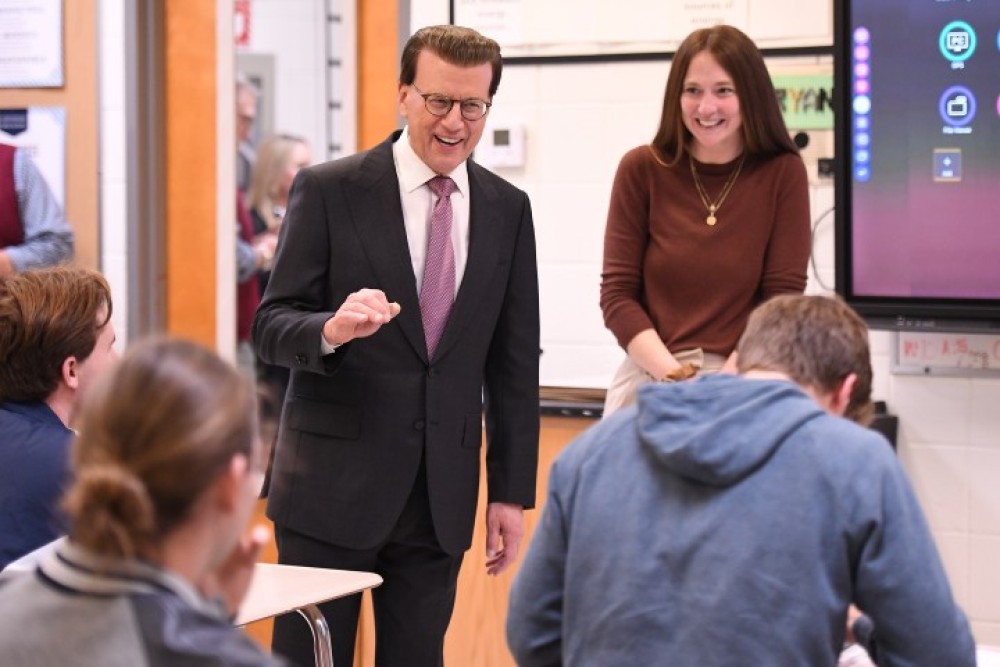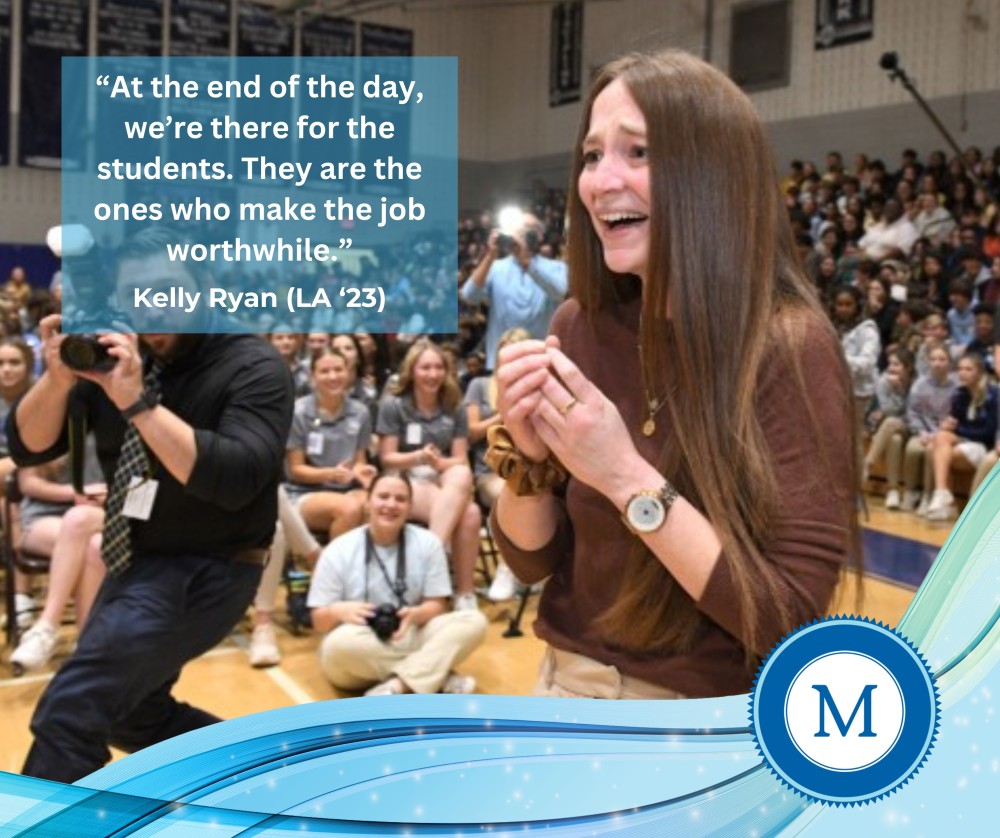Spotlight: Kelly Ryan (LA '23)
October 8, 2024
Louisiana Milken Educator Kelly Ryan is an 11th and 12th grade science teacher at Northshore High School. Ryan immerses her students in collaborative scientific exploration and emphasizes higher order thinking skills. She’s driven by her love for students. “At the end of the day, we’re there for the students. They are the ones who make the job worthwhile.” Ryan received a 2023-24 Milken Educator Award in Louisiana on February 7, 2024.
Milken Family Foundation: How have students responded since your Milken Educator Award surprise?
My students have been really supportive and happy for me. Of course, I get constant questions about borrowing money or why I haven’t retired yet, but the overall response has been really genuine and positive. My fourth hour class still likes to ask me for a pizza party that they now feel entitled to, and I keep telling them “I can’t afford it.” I even have random students who I don’t know pass me in the halls and say things like, “Aren’t you that teacher that won that money?” And I usually jokingly reply that it was someone else, but they never fall for it. I also have the highest enrollment ever in my AP Environmental Science class this year (from a maximum of 13 to 22 and counting), and I like to think that the award has played a small part in that!
MFF: Who are your role models as an educator? Is there an experience you had in the classroom as a student that shaped your practices or motivation to teach?
I look up to my colleagues that show a real passion for teaching. When I see coworkers that are truly invested in their work and growing their students, it can be really inspiring and motivating for me. I do look back to many of my past teachers for inspiration, and it is always the ones who had us doing hands-on, interactive, and project-based activities that stand out to me.
I remember my kindergarten teacher would put her name as a bonus on every spelling test, because it was a difficult name to spell, but now I’ll never forget it. I remember my third grade teacher who created a miniature society in class where everyone was given a unique job and could earn or lose “money” throughout the year. I remember building my simple machine project (an eraser clapper with removable Velcro erasers) in that same third grade class, and my teacher “buying” it back from me to use as examples for future years. I can still sing every word to the song my fifth grade teacher taught us to memorize helping verbs. My sixth grade teacher created a space rocket simulator for us, and I still remember pressing all of the buttons and switches. I will never forget the “sludge lab” in my ninth grade physical science class where we had an entire semester to try to identify what mixture of chemicals was in the jar given to each of us. I have great grammar skills because we played “who wants to be a nickelaire” every single day in my ninth grade English class. I spent the entire summer between ninth and 10th grade collecting 50 unique species of insects for Mrs. Knip’s infamous “bug project,” and now I can recognize various beetles and butterflies (and remember their Latin names) when I come across them in the wild.
As you can see, I still vividly remember many things that I did in classes as early as kindergarten, and I know it is because those teachers made it a point to engage their students in unique, fun, active-learning activities. I can only hope that this is the way my students will remember my class.
MFF: Tell us about your first year of teaching. What memories stand out? Who or what helped you through it?
My first year of teaching was a huge learning experience. I honestly can’t believe I’m where I am now, when I look back on that first year. I had zero public high school teaching experience at that point, having only taught for a private test prep company and my university, which waived my requirement for student teaching. So, when I was thrust into the classroom with little to no guidance, it was daunting to say the least. I would not have survived that first year (and many years after) without my mentor and across-the-hall neighbor, Mrs. Galatas. We both taught chemistry, and I had actually been in her honors chemistry class when I was a junior at this same school. That first year, I would spend every planning period sitting in the back of her classroom, observing her teaching, classroom management strategies, and taking notes. The familiarity and comfort I already had with her evolved into a lasting friendship that we still have today, despite the fact that she retired five years ago.
MFF: What do you hope students remember from their time with you?
For the Louisiana Department of Education’s Teacher Leader Summit, I was asked to submit a six word story that summarizes me as a teacher. Mine was: “When challenged to think, students prosper.” The main thing I want my students to remember is that they can overcome challenges, and they can do hard things. I honestly don’t mind if they don’t remember a single fact about chemistry, as long as they leave knowing that they can accomplish anything with effort, determination and perseverance. A lot of students these days tend to give up the moment they are challenged with something difficult or new. When I can get a child to keep trying, and they have that “aha” moment when it finally clicks, it is incredibly fulfilling for both the student and me. One of my favorite quotes is by Einstein: “Education is not the learning of facts, but the training of the mind to think.” This concept is the legacy I hope to leave with my students.
MFF: Your involvement and commitment to post-grad preparation is evident through the creative and effective strategies you’ve implemented aimed at improving ACT scores through student investment. How do you balance teaching content knowledge with test-taking strategies? What strategies have you found most effective in helping students improve their ACT scores or attitude around test-taking?
I have found that the best way to teach ACT strategies within a class is to embed it into the curriculum, rather than keeping the two separate. Some ways to implement these strategies are: timing class activities; using ACT-style questions on assessments and classwork; and grading on a similar scale to the ACT. Additionally, when a teacher maintains a rigorous classroom environment, the students will naturally be able to perform better on the ACT, just by having developed the essential critical thinking and problem solving skills that are necessary for the new problems they will see on the test.
When I do ACT practice in class, I make sure that there is a fun component involved. I always time it in a similar minute to question ratio as the ACT, and I often include groupwork afterward to help students share their different perspectives and approaches to problems. I love walking around and listening to their discussions during these activities; I often learn new ways to think about problems that I wouldn’t have considered myself.
A crucial part of growing a student’s ACT score is self-diagnosis of strengths and weaknesses and making sure to go over any problems directly after. When the students are given the opportunity to score themselves and see what they did right and wrong immediately after, it is much more effective than just grading it myself and moving on. As far as instilling an “ACT culture” in students and around school, there are many ways to achieve this. For students, they like to be celebrated. We have a comprehensive incentive program for juniors that gives them points for participating in ACT prep activities during the year and for increasing their scores. At the end of the year, students can trade in their points for various rewards. These rewards range from homework passes, cut-the-line at lunch passes, free-dress-day passes, Panther bucks, invitation to a pizza party, entries into prize raffles, and more. It’s important to focus on growth, not just earning a certain score, because some students may never be able to make a 30, but if they grow from a 15 to a 21, that’s huge.
We also always include ACT WorkKeys in these programs, because not all our students are on the college diploma track and that’s perfectly okay. When the statewide test is approaching, I put out signs in the car lines for both parents and students to see that have various facts and statistics about the ACT and why it’s important. It’s also important to show students and parents what kind of opportunities are out there for all students, not just those planning to attend college. We usually host a parents night to showcase these facts and opportunities. On the morning of the statewide ACT, I host an “ACT walk” where all juniors are encouraged to come out and walk a lap around the track right before the testing begins. They are also provided a small breakfast snack and water. This is another activity that earns them a point in our incentive program. Research shows that when students are active directly before testing, their scores are higher due to the blood flow to the brain being higher, so their performance is directly and positively impacted. I also invite any junior teachers to join me, and we just try to hype the kids up before their test. This helps create a positive environment surrounding the test and shows the kids that their teachers are there for them and want them to succeed.

MFF: What advice would you share with people who are interested in becoming teachers?
There is so much negativity surrounding the teaching profession these days and that can make it a very unattractive career prospect. I would want people to know that it isn’t all negative. Yes, it can be challenging, but it is a challenge that brings a sense of accomplishment and fulfillment. To be in a career where you have a direct impact on the future generations of society is unique, and it can be really rewarding when you know that you have made a positive difference in just one child’s future. At the end of the day, we are there for the students, and they are the ones who make the job worthwhile.
MFF: Are you working on any interesting initiatives or new projects these days? Is there anything else you want to share about your school?
I am currently in the process of establishing free monthly or bimonthly Lego robotics workshops for middle school students, run by students. I coach a middle school robotics team and next year, we will begin offering after-school workshops for other kids to experience programming and robotics. The team is composed of students aged nine through 12 who will be the ones teaching their peers how to program the robots. It will be a fun, incredible learning experience for my team and the student guests that we have attending. The team will not only have to hone their own programming skills, but also learn how to share those skills with others. I am really excited to see how it goes, and hopefully we get to show all types of kids and parents that the STEM field can be fun and accessible.
Don’t miss any new articles and updates from Milken Educator Awards:


